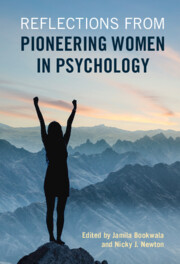Book contents
- Reflections from Pioneering Women in Psychology
- Reflections from Pioneering Women in Psychology
- Copyright page
- Contents
- Contributors
- Foreword
- Acknowledgments
- Introduction
- Chapter 1 Hardly a Straight Line
- Chapter 2 Challenging Paradigms
- Chapter 3 From Young and Naïve to Old and Experienced
- Chapter 4 Being the Change You Want to See in the World
- Chapter 5 Accidental Professor
- Chapter 6 Finding a Place and Changing the Space
- Chapter 7 The More You Do, the Better It Gets
- Chapter 8 Happily Ever After
- Chapter 9 Love and Work
- Chapter 10 Overcoming Obstacles and Thriving
- Chapter 11 Out of the Box
- Chapter 12 Stress Has Been Good to Me
- Chapter 13 On Pioneering at Northwestern University… With a “Village” of Supports
- Chapter 14 Against All Odds
- Chapter 15 Tricked by Memory
- Chapter 16 Doing Psychology in Unsettled Times
- Chapter 17 Overcoming Obstacles
- Chapter 18 Knocking on Doors that Opened for Me
- Chapter 19 Paths Unexpected, but Rewarding, during an Academic Journey
- Chapter 20 Reflections on an Improbable Journey
- Chapter 21 The Delicate Art of Balancing Serendipity and Planfulness in an Academic Career
- Chapter 22 A “Skin in the Game” Scaffolded Career Path
- Chapter 23 A Wonderful Journey Along an Unforeseen Path
- Chapter 24 Choosing Both
- Chapter 25 Identity and My Life Story in Psychology
- Chapter 26 Doing What Matters: A Framework for Academic Success
- Conclusion
- Index
- References
Chapter 20 - Reflections on an Improbable Journey
Published online by Cambridge University Press: 09 April 2022
- Reflections from Pioneering Women in Psychology
- Reflections from Pioneering Women in Psychology
- Copyright page
- Contents
- Contributors
- Foreword
- Acknowledgments
- Introduction
- Chapter 1 Hardly a Straight Line
- Chapter 2 Challenging Paradigms
- Chapter 3 From Young and Naïve to Old and Experienced
- Chapter 4 Being the Change You Want to See in the World
- Chapter 5 Accidental Professor
- Chapter 6 Finding a Place and Changing the Space
- Chapter 7 The More You Do, the Better It Gets
- Chapter 8 Happily Ever After
- Chapter 9 Love and Work
- Chapter 10 Overcoming Obstacles and Thriving
- Chapter 11 Out of the Box
- Chapter 12 Stress Has Been Good to Me
- Chapter 13 On Pioneering at Northwestern University… With a “Village” of Supports
- Chapter 14 Against All Odds
- Chapter 15 Tricked by Memory
- Chapter 16 Doing Psychology in Unsettled Times
- Chapter 17 Overcoming Obstacles
- Chapter 18 Knocking on Doors that Opened for Me
- Chapter 19 Paths Unexpected, but Rewarding, during an Academic Journey
- Chapter 20 Reflections on an Improbable Journey
- Chapter 21 The Delicate Art of Balancing Serendipity and Planfulness in an Academic Career
- Chapter 22 A “Skin in the Game” Scaffolded Career Path
- Chapter 23 A Wonderful Journey Along an Unforeseen Path
- Chapter 24 Choosing Both
- Chapter 25 Identity and My Life Story in Psychology
- Chapter 26 Doing What Matters: A Framework for Academic Success
- Conclusion
- Index
- References
Summary
I grew up in a small town in the wild west populated by descendants of early settlers. It was a world of practicality and common sense, where talk did not revolve around the meaning of life. From childhood on, I have been a blend of ambition and inadequacy. The combination was fruitful for getting me through the hoops of higher education and the challenges that followed. My academic journey has included incredible opportunities, particularly of the mentoring variety, as well as interesting obstacles and set-backs. Overall, the driving motivation behind it has been to paint on a big canvas – i.e., to understand human well-being and human becoming in all of its complexity. In so doing, I have been influenced by many mentors, most of whom I have never met. It was reading their work that inspired me and helped me see where to go next. The quest to reach into new territories continues.
- Type
- Chapter
- Information
- Reflections from Pioneering Women in Psychology , pp. 254 - 267Publisher: Cambridge University PressPrint publication year: 2022
References
- 1
- Cited by

